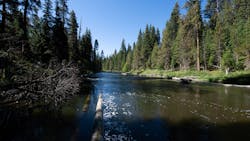Reclamation awards $17.3M in WaterSMART grants
The Bureau of Reclamation has announced $17.3 million in WaterSMART Water and Energy Efficiency Grants for 22 projects.
The funded projects aim to improve water use efficiency, increase renewable energy production, reduce the risk of water conflicts, and provide other benefits that will enhance water supply sustainability in the Western United States.
"Conserving water is saving energy and helping Western communities become more resilient to drought," said Acting Commissioner David Palumbo. "Water and Energy Efficiency Grants provide communities with the necessary, cost-shared funding to modernize their existing infrastructure and conserve water for their communities and the environment."
The selected projects include:
- Installing and upgrading water meters and timers.
- Lining and piping canals.
- Adding automated gate controls.
- Installing solar to reduce power demand.
The projects will be completed in two or three years, depending on the funding received.
The Lower Republican Natural Resources District in southern Nebraska will install near real-time telemetry equipment on 1,057 irrigation flow meters and other water management sensors for improved on-farm water management and reporting. In addition, the district will install eight solar-powered weather stations to collect evapotranspiration data to inform irrigation scheduling in the area. The project will receive $2,000,000 with a total project cost of $4,360,858.
The Bard Water District, located in southern California near the Arizona border, will line a 1/2 mile section of the currently earthen upper Mohave Canal with concrete. The project is expected to result in annual water savings of 498 acre-feet, which is currently lost to seepage, evapotranspiration, and operational losses. Conserved water will remain in the Lower Colorado River System and can be used by other water users during drought years and in times of shortage, including the Quechan Indian Reservation. The project will also allow farmers to continue to work with the Natural Resources Conservation Service’s Environmental Quality Incentives Program to improve irrigation systems. The project will receive $484,340 with a total project cost of $968,680.
The Quincy-Columbia Basin Irrigation District in central Washington will line 2,500 feet of the earthen West Canal. The project will help address regional water reliability concerns, including drought, groundwater issues, and improved stream flows to assist salmon recovery. The project will receive $300,000 with a total project cost of $750,000.
A list of all the selected projects is available here.
